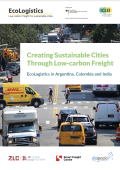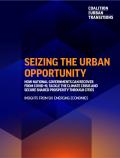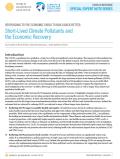
The purpose of this report is to review existing urban freight movement characteristics across the nine EcoLogistics project cities in Argentina, Colombia and India, provide an account of baseline GHG emissions (2019) from urban freight and identify possible interventions to minimise its negative impacts.

National governments can spur COVID-19 recovery, achieve shared prosperity and drive climate action through national policies and targeted investments to decarbonise cities and make them more resilient. This report shows the power of urban transformation and the many ways to achieve it by looking up close at six major emerging economies: China, India, Indonesia, Brazil, Mexico and South Africa.

This note promotes the links between short-lived climate pollutants (SLCP) mitigation and the economic recovery. It highlights examples of how countries are addressing SLCPs in their recovery plans and provides options for resourcing the recovery. The report is aimed at public policymakers and their advisers.
The Global Green Growth Institute (GGGI) is developing a Simulation Tool based on coupled system dynamics models for the different indicators of the Green Growth Index. As illustrated in this technical report, such models are very complex but, at the same time, extremely useful in exploring relevant scenarios on future implications of policy and investment decisions on green growth transition.
This report introduces the concept of a Zero-Emissions Delivery Zone (ZED Zone), a new innovative financing model that can accelerate commercial vehicle electrification, while delivering substantial financial, social and environmental returns for forward-thinking investors.
